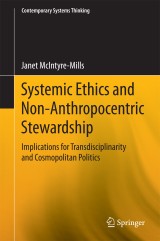Details

Systemic Ethics and Non-Anthropocentric Stewardship
Implications for Transdisciplinarity and Cosmopolitan PoliticsContemporary Systems Thinking
|
53,49 € |
|
| Verlag: | Springer |
| Format: | |
| Veröffentl.: | 01.10.2014 |
| ISBN/EAN: | 9783319076560 |
| Sprache: | englisch |
Dieses eBook enthält ein Wasserzeichen.
Beschreibungen
This book makes a case for rights and responsibilities to be expressed through a cosmopolitan praxis based on developing strong cosmopolitan approaches. This developed approach respects a form of cultural or national identity that is not at the expense of others, the environment or future generations. This new stoicism is based on a sense of responsibility for others. The book also explores systemic ethical praxis in response to the vexed challenge of how to bridge the false dualism of pitting the environment versus profit. Systemic Ethics and Non-Anthropocentric Stewardship: Implications for Transdisciplinarity and Cosmopolitan Politics is organized into seven chapters. The book begins by providing readers with an understanding of the way in which cosmopolitanism (like all social concepts) is shaped by diverse definitions and applied differently by theorists and those that engage in transformative praxis. It also develops an argument based on considering the empirical consequences of social, economic and environmental decisions on the quality of life of current and future generations. The next chapter critiques anthropocentricism and explores how policy makers develop agreements on what constitutes and supports the wellbeing of the planet rather than the GDP. The book then explores the options for social democracy and ways to enhance an ethical approach to post national governance and argues for participatory democracy and governance to respond to diversity within and across national boundaries. The following chapters reflect upon the author’s own participatory action research process and examines the transformations that can arise through critical systemic thinking and practice. Next the book makes the case for systemic ethical governance that is able to manage consumption, before concluding with a final look at the book’s approach, based on critical heuristics.
Cosmopolitan Politics: making a case for systemic praxis.- Critiquing Anthropocentricism: implications for rights and responsibility for others.- Beyond State Containerism:<i> Implications for containing capitalism and protecting the environment.- </i>Extending our horizons: <i>Implications for transdisciplinarity, democracy, governance and ethics.-</i> Re-membering, Re-connecting and Re-directing the gaze.- Systemic Ethics for Social and Environmental Justice.- Conclusion.
<p>Janet McIntyre-Mills is Associate Professor Flinders University, and Adjunct Professor University of Indonesia. Her books address social and environmental justice concerns and include, for example: ‘Global Citizenship and Social Movements’, Harwood, McMillan, ‘Critical Systemic Praxis for Social and Environmental Justice’, Springer; ‘Systemic Governance and Accountability: working and re-working the conceptual and spatial boundaries,’ published by Springer; ‘User Centric policy design to address complex need’s, Nova Science. Emergence has recently published ‘Identity, democracy and sustainability’. It proposes a new architecture for governance.</p><p>Her research addresses wellbeing, consciousness and cosmopolitan ethics associated with the design and transformation of governance and democracy. It focuses on excessive social, economic and environmental consumption and suggests ways to mitigate the worst impacts of climate change through protecting cultural ecosystems. She is a board member of several journals, including the Journal of Globalization Studies, Systems Research and Behavioural Science, for example. She is an elected board member of Research Committee 10 on Participation and Organizational Transformation of the International Sociological Association and has participated in Research Committee 51 of Socio-cybernetics. She is also a member of the International Systems Sciences and the Action Learning and Action Association.</p>
<p>This book makes a case for rights and responsibilities to be expressed through a cosmopolitan, non-anthropocentric praxis based on responsibility for others and the environment. <i>Systemic Ethics and Non-Anthropocentric Stewardship: Implications for Transdisciplinarity and Cosmopolitan Politics</i> is divided into seven chapters. Systemic ethical praxis strives to respond to the vexed challenge of how to bridge the false dualism of pitting the environment versus profit. The book begins by providing readers with an understanding of the way in which cosmopolitanism (like all social concepts) is shaped by diverse definitions and applied differently by theorists with different assumptions and values and by those who engage in transformative praxis. It develops an argument based on considering the consequences of social, economic and environmental policy decisions for current and future generations of life. The next chapter critiques anthropocentricism and explores how policy makers develop agreements on what constitutes and supports the wellbeing of the planet rather than merely addressing the GDP. It emphasizes the continuum of all life and that the survival of human beings is dependent on recognizing our reliance on all forms of life on a sustainable planet. The book then explores the options for social democracy and ways to enhance an ethical approach to post national governance to protect the fabric of life. The following chapters reflect upon the author’s own participatory action research process and examine the transformations that can arise through critical systemic thinking and practice. Next the book makes the case for systemic ethical governance that is able tomanage consumption, before concluding with a summary of the praxis based on critical heuristics. </p><p>This is the companion book to <i>Transformation from Wall Street to Wellbeing: Joining up the Dots through Participatory Democracy and Governance to Mitigate the Causes and Adapt to the Effects of Climate Change, </i>also by the author. The two volumes comprise a series of essays that can be read separately and in any order or as chapters on a common theme, namely, “How should we live?”</p><p> </p><p>
Introduces a new cosmopolitan approach for systemic praxis Argues that rights and responsibilities should be expressed through a cosmopolitan praxis based on developing the strong rather than weak cosmopolitan approaches Discusses systemic ethical praxis in response to the challenge of how to bridge the false dualism of pitting the environment versus profit Includes supplementary material: sn.pub/extras

















